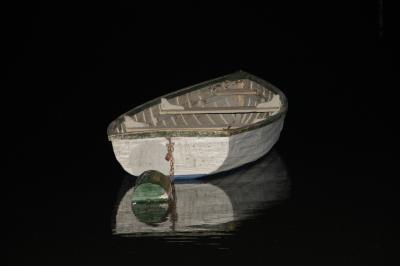 Added£0.99
Added£0.99Add to basket(A short story of 3579 words)
The Night Study
Historical Fiction Literary
by David Phelps
A Danish painter is driven into exile by his father. But he can never escape the chains of the family's dark secrets.
I watched the face of the man who could destroy me and, even then, I remember thinking what a fine composition this room would make. The mighty bookcases indistinct in the darkness, the fire in the grate, illuminating the faces of the two men drinking but clearly having no care or regard for each other.
I had never been good enough for my father but I could always trust my younger sister to act as a bridge between him and me. It was to her that I could show my paintings, before my father destroyed them.
When my father insisted that I go into the family business, that was when I knew I had to leave. But at regular intervals I would row over the lake to see her when my father was away. When she told me he was making her marry his old business partner I wanted to go and confront him but I did not really have the courage and was too easily persuaded by my sweet sister not to do anything.
On the night of the wedding I stayed on the other side of the lake, looking at my old home lit up in festivity. As the music died I rowed over to where I knew my sister would be waiting. That night we said our last farewells, for the next day she would be leaving for Copenhagen. I knew the composition we made was beautiful.
Angrily I threw myself into painting, feeding on my melancholy. I tried a palette of blacks and greys but could not cope with these. Instead I painted the summer fields of my childhood, all greens and yellows and a bright blue sky. I despised my weakness. Even more so when I was taken up by the London art market, my bright daubs becoming popular with the bourgeoisie because enough influential critics liked them...
I watched the face of the man who could destroy me and, even then, I remember thinking what a fine composition this room would make. The mighty bookcases indistinct in the darkness, the fire in the grate, illuminating the faces of the two men drinking but clearly having no care or regard for each other.
I had never been good enough for my father but I could always trust my younger sister to act as a bridge between him and me. It was to her that I could show my paintings, before my father destroyed them.
When my father insisted that I go into the family business, that was when I knew I had to leave. But at regular intervals I would row over the lake to see her when my father was away. When she told me he was making her marry his old business partner I wanted to go and confront him but I did not really have the courage and was too easily persuaded by my sweet sister not to do anything.
On the night of the wedding I stayed on the other side of the lake, looking at my old home lit up in festivity. As the music died I rowed over to where I knew my sister would be waiting. That night we said our last farewells, for the next day she would be leaving for Copenhagen. I knew the composition we made was beautiful.
Angrily I threw myself into painting, feeding on my melancholy. I tried a palette of blacks and greys but could not cope with these. Instead I painted the summer fields of my childhood, all greens and yellows and a bright blue sky. I despised my weakness. Even more so when I was taken up by the London art market, my bright daubs becoming popular with the bourgeoisie because enough influential critics liked them...



